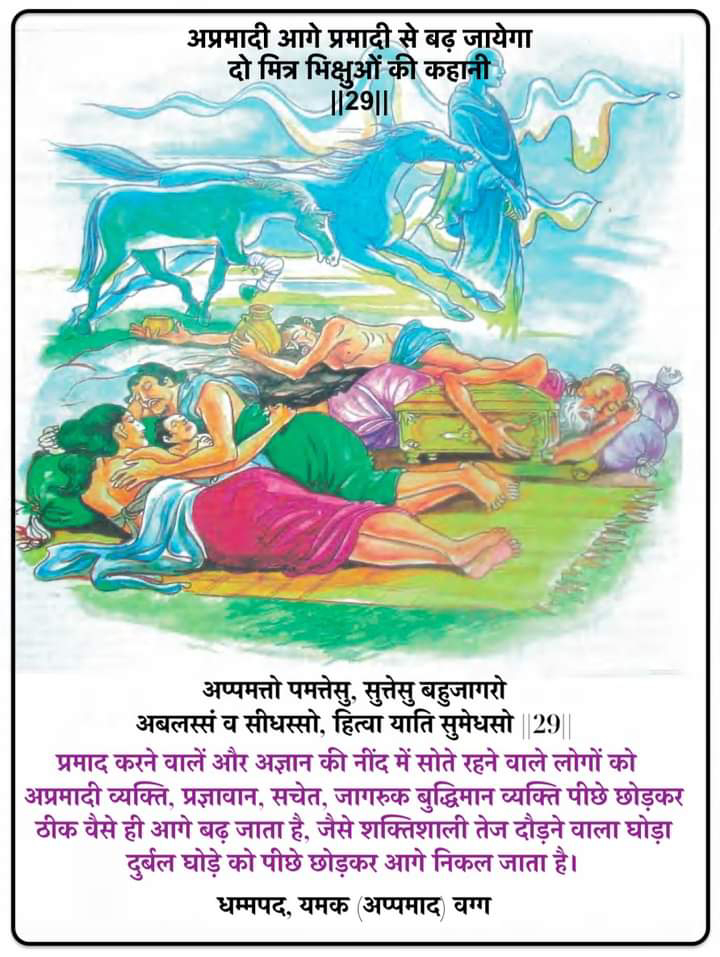The Mindful-one, is way ahead of others.
धम्मपद सुत्त 29: कहानी का शीर्षक: अप्रमादी (मेहनती) एवं मन से सावधान व्यक्ति सभी से आगे निकल जायेगा
परिचय-यह सुत्त "सम्म्यक संबुद्ध" द्वारा सुवत्थी (श्रावस्ती) के जेतवन मठ में "दो साथी भिक्षु-मित्रों की कहानी" के संबंध में कही गई थी।
(English Translation) Introduction -This sutta was spoken by "The Self-Enlightened One" at the Jetvana monastery at Suvatthi in relation to "The story of two companion monk friends".
दो साथी भिक्षु-मित्रों की कहानी:
एक बार दो युवा मित्रों ने प्रव्रज्या ली और भिक्षु हो गये जंगल में जाकर अपने-अपने ढंग से ध्यान-साधना करने लगे। उनमें से एक युवा आलसी था और दूसरा उद्यमी (मेहनती)।
आलसी साधक लकड़ियाँ इकट्ठी कर उन्हें जला लेता और युवक श्रमणों से गप्पें लड़ाते हुए अपना पहला प्रहर बिता देता था। दूसरी ओर मेहनती और सावधान युवा भिक्षु अपना अधिक समय साधना में लगाता और यह जानते हुए कि आलसी और असावधान व्यक्ति के द्वारा धर्म के नियमों का पालन करना असंभव है वह अपने आलसी मित्र भिक्षु को सलाह भी देता कि वह अपना समय बेकार की गप्पों आदि में नष्ट न करे। मगर उसका आलसी-असावधान मित्र अपने मेहनती-सावधान मित्र-भिक्षु की बातों पर ध्यान नहीं देता था।जब बहुत बार कहने पर भी आलसी भिक्षु मित्र के समझ नहीं आया तो मेहनती भिक्षु अपनी साधना में रत रहने लगा।
आलसी मित्र भिक्षु-साधक कुछ दुष्ट प्रकृति का भी था। इसलिए जब सावधान-साधक साधना की समाप्ति पर थोड़ा सोने के लिए होता तो आलसी साधक उसके पास आकर उल्टा व्यंग करते हुए कहता, “अरे ओ, आलसी! साधना करने हेतु वन में आए हो या सोते-सोते समय गँवाने के लिए? जेतवन बुद्ध की कर्म स्थली है यहाँ तो सावधान रहकर साधना ही करनी चाहिए।" ऐसा कहकर, स्वयं दूसरी ओर जाकर सो जाता था। सावधान साधक अपने साथी की बात को ध्यान रखकर बहुत थोड़े समय विश्राम (नींद) कर फिर से उठ जाता और एक बार पुनः ध्यान-साधना में लग जाता। इस प्रकार निरंतर अभ्यास करता हुआ सावधान साधक ने कुछ ही दिनों में अरहंत (ज्ञान की अंतिम अवस्था) हो गया और उसका आलसी असावधान भिक्षु-मित्र पूर्ववत प्रमाद में ही समय बिताता रहा। जब तीन महीने का वर्षावास समाप्त हुआ तब दोनों साधक तथागत बुद्ध के पास लौटे तब सबसे पहले बुद्ध ने उनका कुशलक्षेम जानकर आगे पूछा कि उनकी साधना कैसी रही? तब आलसी भिक्षु ने तुरंत कहा,"इस प्रमादी भिक्षु की बात न करें। इसने तो अपना पूरा समय लेटकर सोते हुए बिता दिया।" जब बुद्ध ने पूछा कि "तुमने क्या किया ?" तब आलसी भिक्षु ने कहा “मैं पहले दिन से ही रात्रि के प्रथम प्रहर से ही आग जलाकर उसके पास बैठकर साधना करता रहा। बुद्ध ने यह समझकर कि वह झूठ बोल रहा है, बोले "अरे पुत्र !तुम उल्टे सावधान उपासक की निंदा क्यों कर रहे हो कि उसने अपना समय व्यर्थ, असावधानीपूर्वक बिताकर प्रमाद (आलसी और असावधान) की तुलना अप्रमाद (मेहनती और सावधान) क्यों कर रहे हो?'
(English translation) The Story of the Two Companion Monk Friends:
One two young friends obtained their ordination and Dhamma from "the Buddha" and became monks. It's customary for monks to retire into a forest hermitage during rainy season, so they did. Every morning in the early hours one of them brought firewood, prepared the fire and sat for meditation and contemplation during the first watch, while the other lazy (heedless) friend sat and chatted with the other young probationers and novices. The heedful (mindful and zealous) monk, kept engaged in meditation, several times warned his heedless lazy friend about not wasting his time. When the lazy monk paid no attention to his friendly admonition, the zealous monk said, “This monk cannot endure to be spoken to.” Having failed to spur his com- rade to greater effort, the zealous monk, abiding in heedfulness, resumed his meditations.
This slothful Bhikhkhu used to get warmed himself during the first watch and when his zealous friend was getting ready for some rest and sleep would tell " Aye, slothful one, you did not come to the forest for the purpose of lying down and sleeping. You have not obtained Dhamma and ordination from the Buddha for sleeping away in the forest. Don't waste a single moment. Devote yourself to the practice of meditation” After saying these words, he would go to his place of residence, lay down, and sleep. Being mindful and zealous his friend, after doing his walking mediation during the first watch and resting during the second watch, devote himself again in the last watch to the practice of meditation. Living thus the life of heedfulness he attained Arahatship, together with the Supernatural Faculties.
When the two monks had completed rainy residence in the forest, returned to the Buddha, paid obeisance to him, and sat down respectfully on one side. The Buddha exchanged friendly greetings with them and queried, “I trust that you have lived the life of heedfulness and that you have devoted yourselves earnestly to the practice of meditation. I trust that you have reached the goal of the Dhamma.” The heedless monk replied, “venerable, how can this monk be said to be heedful? From the
time he left you he has done nothing but lie and sleep.” But Venerable, I on the other hand woke up early in the morning brought firewood and prepared the charcoal-dish, and during the first watch I sat and warmed myself and meditated. I did not spend my time sleeping.” Then said the Buddha to the slothful monk, “You who have spent your time in heedlessness and yet say, ‘I am heedful.’ You mistake heedlessness for heedfulness. My son, you are like a weak and slow horse; but he, compared with the other heedful monk, is like a fleet-footed horse.”
कहानी का संदेश; "जो लोग सतर्क और सचेत हैं वे उन लोगों से आगे निकल जाते हैं जो सुस्त और लापरवाह हैं। इस बात पर जोर देने के लिए बुद्ध ने इस कहानी में कई उपमाओं का प्रयोग किया हैं। वे कहते हैं कि अधिक नींद न लेने वाला (कड़ी मेहनत करने वाला) व्यक्ति जागता है और उन लोगों से आगे निकल जाता है जो अपना समय आलस्य में बर्बाद करते है। इस तरह बुद्धिमान लोग बहुत आसानी से नासमझ, मूर्ख व्यक्तियों से आगे निकल जाते हैं। ठीक उसी तरह से जैसे सत्य की खोज करने वाले, जो अपनी खोज में दृढ़ रहते हुए अपनी आध्यात्मिक उपलब्धियों में दूसरों से आगे निकल जाते हैं। लापरवाहों के बीच सावधान, नींद में जागते हुए, बुद्धिमान व्यक्ति उसी तरह आगे बढ़ता है जैसे एक सक्षम तेज़ घोड़ा, एक कमज़ोर घोड़े को पीछे छोड़ते हुए।"
Translation of the message is; "Those who are alert and mindful overtake others who are lethargic and unalert. To emphasize this notion several analogies are shown. The sleepless (hard working) person is awake and overtakes those who are sleeping away (lazying) their time. This way the wise ones very easily over- take the unintelligent, foolish individuals. Among the truth-seekers those who are steadfast in their search overtake others in spiritual attainments. Heedful amongst the heedless, wide awake amongst the slumbering, the wise-man advances as does an able swift horse, leaving a weak jade behind."




Comments
Post a Comment